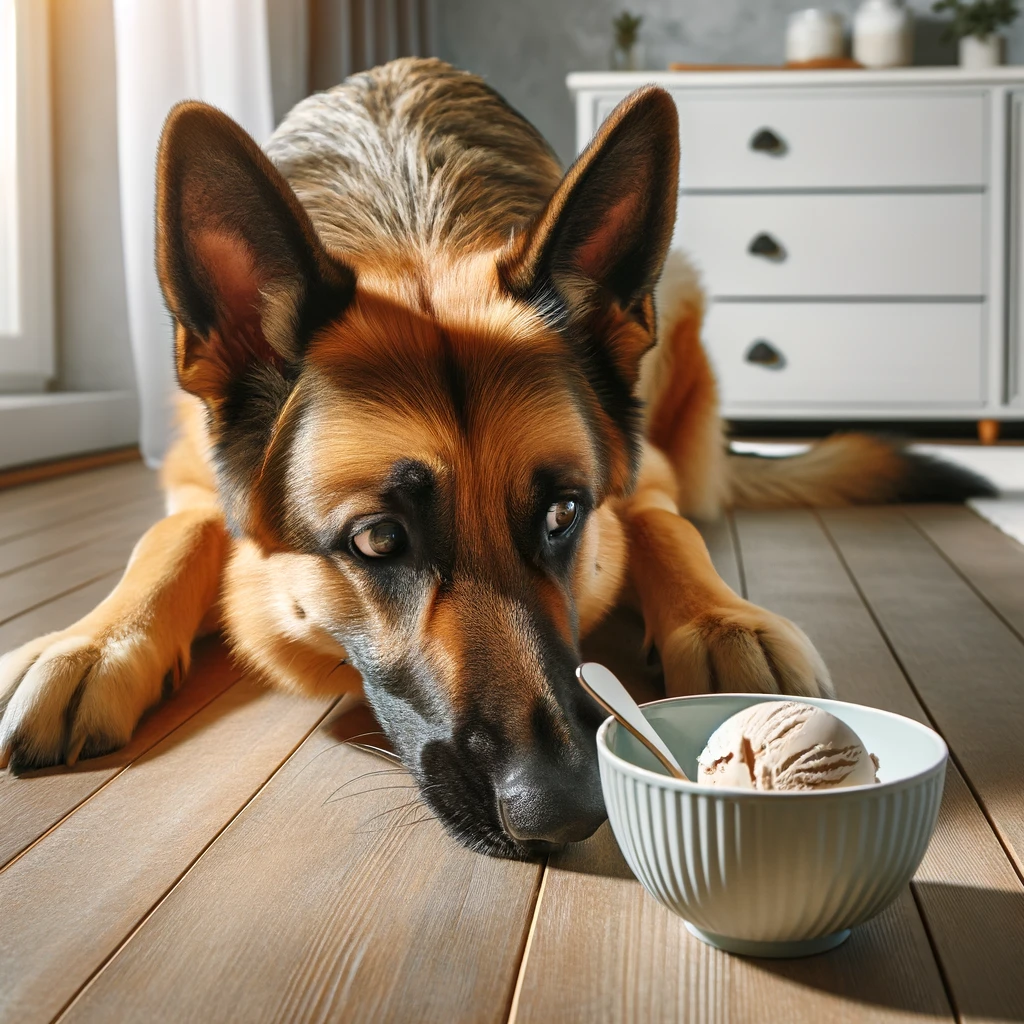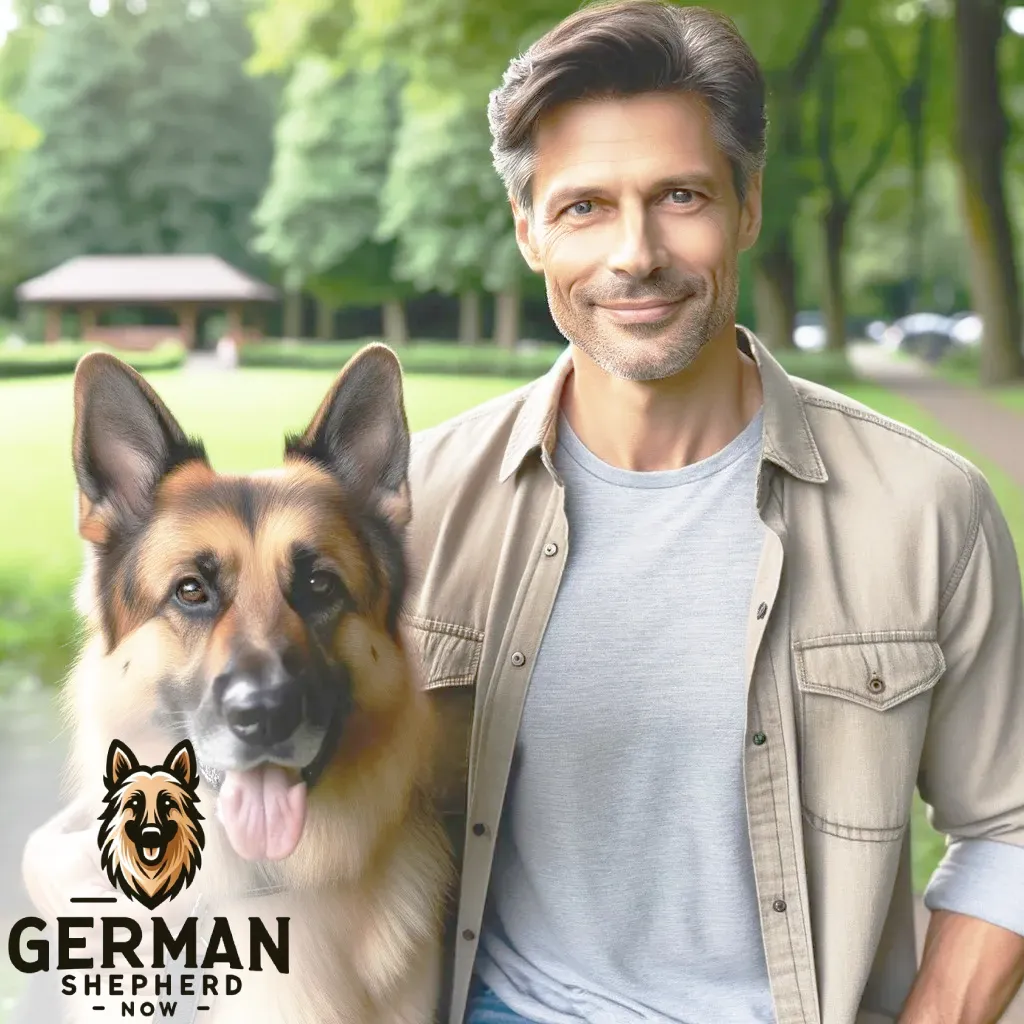Can German Shepherds Eat Ice Cream

German Shepherds can eat ice cream, but it is not recommended as part of their regular diet.
Ice cream, specially made for human consumption, often contains unhealthy sugar and fats for dogs.
Additionally, many dogs are lactose intolerant, which means ice cream could lead to digestive issues.
Choosing dog-friendly treats specifically formulated for their dietary needs is always safer.
Understanding Canine Digestive Health
Understanding the digestive health of dogs, particularly German Shepherds, is essential for responsible pet ownership.
Dogs have a digestive system designed for meat-based diets, with a shorter gastrointestinal tract than humans. This difference affects how they process foods, including dairy products like ice cream.
Many dogs, including German Shepherds, can be lactose intolerant. Lactose intolerance in dogs occurs due to insufficient lactase, an enzyme necessary to break down lactose found in dairy products. This intolerance can lead to digestive discomfort, diarrhea, and other gastrointestinal issues when they consume dairy products.
Dog owners need to understand these aspects of canine health to ensure they provide their pets with a safe and nutritious diet.
The Nutritional Needs of German Shepherds
Understanding the dietary requirements of German Shepherds is key to ensuring their health and longevity. This breed has unique nutritional needs that differ from those of humans.
Specific Dietary Requirements
German Shepherds thrive on a diet rich in high-quality proteins, vital for their muscular build and active nature.
Their diet should also be well-balanced with fats, carbohydrates, vitamins, and minerals to support overall health, including maintaining healthy skin, strong bones, and effective digestion.
Risks of Feeding Human Foods
Feeding German Shepherds human food is risky. Common human foods, like chocolate, grapes, onions, and those with artificial sweeteners such as xylitol, can be toxic to dogs.
Human foods are often too high in fats and sugars, leading to obesity, dental problems, and other health complications in dogs. It’s crucial to be aware of these risks and to provide a diet that meets the specific nutritional needs of this breed.
Ice Cream and German Shepherd: What You Need to Know
Understanding the effects of ice cream on dogs, particularly German Shepherds, is crucial for pet owners.
While sharing this sweet treat with your furry friend might be tempting, it’s important to consider the ingredients and potential health risks.
Ingredients in Typical Ice Cream
Ice cream consists of milk, sugar, flavorings, and additives. Milk and cream, although key to their texture, are often unsuitable for dogs due to their lactose content.
Health Risks of Sugar, Fats, and Artificial Sweeteners
The sugar in ice cream can contribute to obesity and dental problems in dogs. High fat levels, also common in ice cream, can lead to serious health issues like pancreatitis. Moreover, artificial sweeteners, especially xylitol, are toxic to dogs.
Xylitol can trigger a rapid insulin release, leading to life-threatening hypoglycemia. These risks highlight why ice cream is not a recommended treat for dogs.
Lactose Intolerance in German Shepherd
Lactose intolerance is a common digestive issue in dogs, including breeds like German Shepherds.
It occurs when dogs lack sufficient lactase, the enzyme required to break down lactose found in milk and dairy products.
Signs and Symptoms of Lactose Intolerance
Recognizing lactose intolerance in dogs is crucial for their health. Following the consumption of dairy products, symptoms can include gastrointestinal discomfort, such as bloating, diarrhea, and gas.
These signs indicate the dog’s inability to digest lactose, warranting a dietary adjustment to avoid dairy-based foods and treats. Understanding this condition helps provide a diet that ensures your pet’s well-being.
Healthier Alternatives to Ice Cream for Dogs
Finding suitable alternatives to ice cream for dogs, especially those with lactose intolerance, is essential for their health and happiness. Here are some options and homemade treat ideas.
Dog-Friendly Treat Options
Instead of ice cream, consider giving your dog treats formulated for them. Many pet stores offer doggy ice cream without lactose or harmful ingredients, ensuring a safe and enjoyable treat.
Homemade Frozen Treat Recipes
Homemade frozen treats can be a delightful option for a more personalized touch. Simple recipes include freezing dog-safe broth or blending dog-friendly fruits like bananas with yogurt.
These healthier homemade alternatives allow you to tailor treats to your German Shepherd’s dietary needs and preferences.
Understanding Canine Dietary Choices: The Ice Cream Dilemma
Examines whether German Shepherds can consume ice cream safely, focusing on their specific dietary requirements and the potential risks of human foods.
It delves into canine digestive health, the issue of lactose intolerance in dogs, and the effects of ice cream’s ingredients.
The article also suggests healthier, dog-safe treat alternatives. It includes a FAQ section to assist pet owners in making well-informed dietary decisions for their German Shepherds, highlighting the significance of understanding canine nutrition for their health and well-being.
FAQs on Feeding Ice Cream and Human Foods to Dogs
Common questions often arise when feeding dogs ice cream and other human foods. Owners are curious about the safety and health implications of sharing their treats with their pets.
Questions usually revolve around which human foods are safe for dogs, how often they can be given, and what to do if a dog accidentally consumes something harmful.
1. Can dogs eat ice cream?
- Dogs can technically eat ice cream, but it’s not recommended due to lactose intolerance and unhealthy ingredients like sugar and fat.
2. What happens if a dog eats ice cream?
- Dogs may experience digestive upset, including diarrhea and vomiting, especially if lactose intolerant.
3. Are there any safe human foods for dogs?
- Some human foods, like plain cooked chicken, rice, and certain fruits, are safe for dogs in moderation.
4. What should I do if my dog eats something harmful?
- If your dog consumes a harmful substance, contact your veterinarian immediately for advice.
5. Is lactose-free ice cream safe for dogs?
- While lactose-free ice cream eliminates the issue of lactose intolerance, it still contains sugar and fats that are not ideal for dogs.
6. Can dogs have chocolate ice cream?
- No, chocolate is toxic to dogs and should never be given to them, even in ice cream.
7. What are the symptoms of lactose intolerance in dogs?
- Symptoms include gastrointestinal upset like bloating, gas, diarrhea, and discomfort.
8. How can I treat my dog with a safe frozen treat?
- Opt for dog-safe frozen treats in pet stores or make homemade treats using dog-friendly ingredients like fruits and yogurt.
9. Are there any fruits to avoid in homemade dog treats?
- Avoid grapes, raisins, and other fruits known to be toxic to dogs.

I’m Martin, and I grew up in the super cool city of Seattle. You know, the place with all the incredible mountains and forests? Yeah, that’s my playground!
Ever since I was little, I’ve been all about nature. I used to wander around the woods with a notebook, doodling all the cool plants and animals I’d find.
